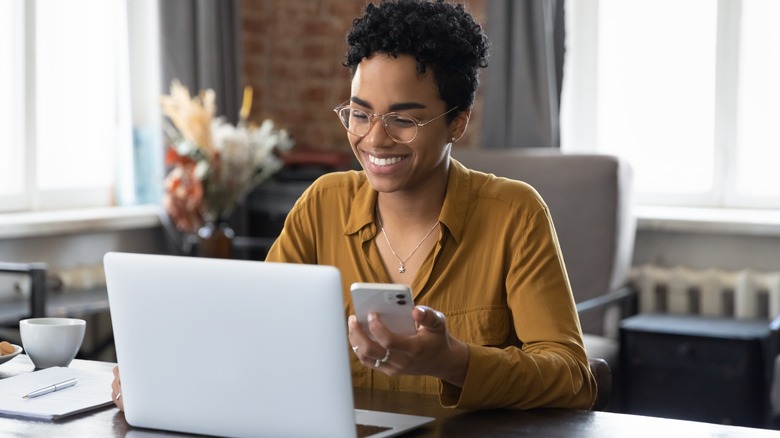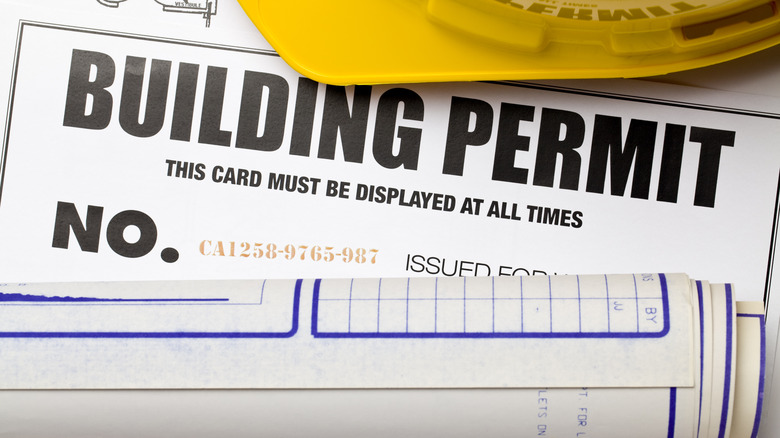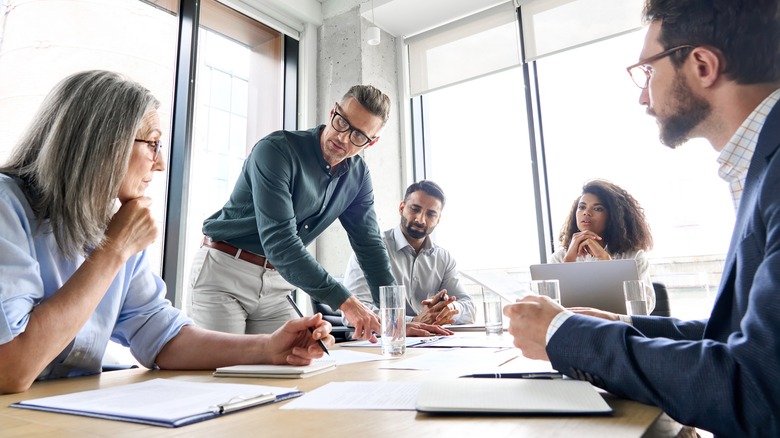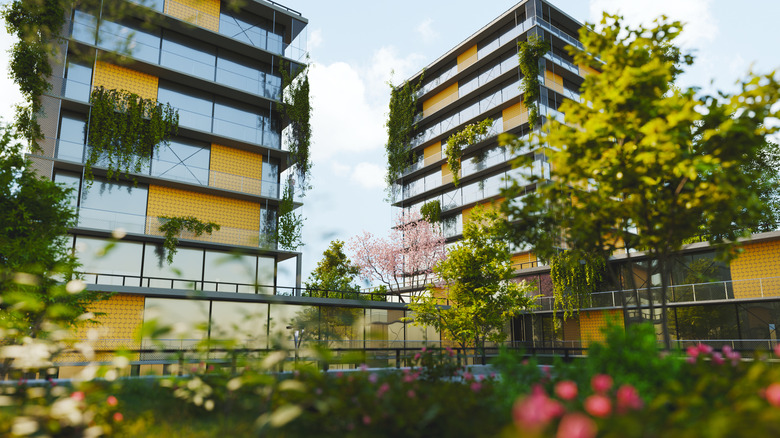Ask An Architect These Essential Questions Before Hiring Them For A Project
Before hiring an architect for a project, it's essential to ask them relevant questions to make sure they have the necessary skills, experience, and understanding so you can get exactly what you want. Whether you're planning to build a house from scratch, remodel your existing space, or embark on a commercial venture, finding the perfect architect is key to the success of the project. If you are building an accessible building, you don't want to work with someone who hasn't done it before. If being eco-friendly is your top priority, it needs to be important to your architect, too.
Think of the architect-hiring process a bit like a job interview — because that's what it is. You are the hiring manager looking for the right person (or firm!) that can help bring your new build to life. We'll explore the comprehensive list of inquiries that will help you assess the expertise, compatibility, and overall suitability of architects before making that all-important hiring decision. And don't worry about being too nosy or pushy. Good architects will expect, and even appreciate, that you ask these questions.
1. Can you provide examples or a portfolio of your previous work?
An architect's portfolio provides insights into the quality of their work. It showcases their experience, expertise, and the level of craftsmanship they bring to projects. Never just take their word for it; have a look through photos to get a good sense of what they can do. By evaluating their past projects, you can assess the architectural quality, attention to detail, and overall excellence demonstrated in their work. This information will help you gauge their capabilities and make an informed decision about whether or not you want to work with them.
In addition to this, looking through an architect's portfolio can serve as a source of inspiration to generate ideas for your project. It allows you to see how they have approached similar design challenges, resolved any spatial issues, or incorporated unique features. By studying their previous work, you may discover things that you never knew you liked and now wish to incorporate into your project.
2. What is your experience in working on projects similar to mine?
You want to hire an architect that has done what you want them to do before. Each architect has a unique approach and aesthetic, so it's crucial to make sure their previous work reflects a style that resonates with your vision. For example, do they tend to do projects in the Mid-Century Modern style when you want an Art Deco home? Does this person tend to build new homes from scratch when you are just remodeling or adding an extension? This is more than just reviewing their portfolio for quality of work. This is the extra step of checking to see if that quality also matches your vision.
The same can be said of the practical features of your home, too. Sure, your architect builds homes in the aesthetic style you like, but are there certain other specifics to be followed? Do you have an irregular-shaped lot? Are you building on a hill? Do you need the home to be accessible for a wheelchair user or a really tall person? Hiring someone who has already done exactly what you plan to do will make the entire process easier.
3. Can you provide any references from previous clients?
Seeking references from previous clients demonstrates that you value transparency and want to make an informed decision. It also shows the architect that you take the selection process seriously and that you are committed to finding a professional who meets your expectations. By obtaining positive references, you can build trust and confidence in the architect's abilities, which is crucial for establishing a strong working relationship.
Getting references from previous clients allows you to assess the architect's past performance and the satisfaction of people with their work. You can learn about their experience working with the architect, the quality of the architect's work, the architect's ability to meet deadlines, their communication skills, and their overall professionalism. Typically, you can't directly ask for people's contact information. However, the architect should have written references with photos of the project readily available for you to look over.
4. What is your role in the construction process?
Architects typically have a role in construction administration. This is because once you break ground, the design intent developed by the architect needs to be brought to life correctly. So the architect will typically do things like review submittals and shop drawings, conduct site visits, and address any design-related issues that may arise during construction. Before hiring them, be sure to ask about their typical process for the building phase of the project. You will want to assess this person or firm's level of on-site presence, their availability for site visits, and their commitment to resolving construction-related challenges with contractors and suppliers.
As your representative during the construction phase of the process, before you hire them you should determine how they advocate for your interests, communicate with contractors on your behalf, and ensure that the construction aligns with your requirements and expectations. This representation helps protect your investment and ensure quality control, so you want to make sure it's available.
5. Can you estimate the overall cost of the project and your fee structure?
You should always know the money side of things before signing anything. A detailed cost estimate from the architect helps you get a better idea of areas where costs may exceed your budget. You might also be able to adjust the scope of the project so the bulk of your money is spent on your top priorities with less cash invested in what isn't important to you. It's better to know all costs ahead of time, as adjusting prices once the contract begins isn't as easy.
In addition, by asking about the architect's fee structure up front, you can understand how they charge for their services. They might charge a fixed fee, an hourly rate, or a percentage of the project cost. You also need to find out what services are included in their fee, like design development, construction documentation, project management, and coordination with contractors. Finally, ask when each payment is due. Is it 100% upfront? A small portion as a down payment with monthly installments after? There are many different fee structures, so it's important to know which one you are dealing with.
6. How do you manage the project timeline and ensure an on-time completion?
You don't want things dragging on for months when you would like your project moving full speed ahead. To avoid this, speak with your architect about the typical timeline for their projects, as well as how they stay on track before signing anything. If you can understand the architect's approach to project timeline management, it also allows you to assess their level of organization and planning. It gives you a look into their ability to develop a realistic project schedule that outlines all the key milestones and deadlines.
That said, construction projects often encounter unforeseen challenges, like design revisions, material availability issues, or unforeseen site conditions like bad weather. How the architect manages these unexpected situations can greatly impact the project timeline. But, if you know how a person or firm tends to handle setbacks like this ahead of time, it won't be as frustrating as you will have a plan in place when issues arise. You can ask for specific examples of how they have overcome setbacks in past projects, so you can decide if their outlook and styles mesh with your expectations.
7. Are you familiar with the local building codes and regulations that apply to my project?
Local building codes and regulations are put in place to ensure the safety, structural integrity, and overall quality of construction projects. There are a lot of consequences to not following the rules, like legal consequences, financial penalties, project delays, or even forced demolition. By confirming that the architect is familiar with the local codes, you can be assured that your project will be designed and executed in compliance with the law. Plenty of knowledge of local building codes also means the architect can integrate these requirements into the design from the beginning. This prevents the need for extensive redesigns or modifications later on, saving time, effort, and potentially costly revisions.
The tricky part is, building codes and regulations can vary a lot, even within the same state. The state of Texas has one set of rules, and the city of Houston has another, but Harris County has just one more extra form to fill out. Working with an architect who is familiar with working in the area you plan to build is ideal. This familiarity can streamline the project's progress and help in securing necessary approvals and permits more efficiently.
8. What is your communication style, and how often will we have project updates?
When you hire an architect, you need to make sure their communication style matches yours. Some firms may prefer regular face-to-face meetings with clients to keep them updated on the project's process, while others may keep things remote and rely on phone calls or video chats. Others still might prefer no set meeting times and simply provide updates on the project and answers to questions via email. There is no right or wrong way to communicate with your architect, you just need to make sure their standard business practice is one you can get behind.
In addition to the preferred method of communication, you also need to know how often you should expect to hear from them. Will they check in with you once a fortnight? Monthly? Daily as the project progresses? One thing that should never happen is chasing down an architect for an update on your project. If you know when you should expect to hear from them and how they plan to get in touch, it will save you a lot of worry.
9. How do you handle changes or modifications during the design and construction phases?
Design is such a collaborative project that it is likely you will want to make changes to your plans throughout the process. Before hiring an architect, you should ask about the procedure they prefer around making changes to designs. For example, will you be purchasing a ready-made plan and any personalizations come with a fee? Or are there one or two rounds of changes included in the process? If you are custom-designing a project, will the architect charge you to edit plans that you don't like? Are they open to client feedback like this at all, or do they expect you to accept whatever they give you?
You should also ask about the cutoff for any changes to a design. Sometimes, there won't be a technical cutoff because anything can be fixed for a price. However, in this case, you would need to know the deadline for free changes to plans. You will also need the architect to tell your their process for receiving changes. Do you have to have a meeting to discuss them? Can you send them over in a text or email?
10. How do you handle potential conflicts or disagreements during the design process?
There is going to be conflict during any design and construction project. Even if you are financing the build on your own and don't have a spouse or business partner to argue with, something will come up. Be it with the architect over a design feature, a supplier over back-ordered parts, or a contractor over the quality of work — something will come up.
These conflicts can impact your overall satisfaction with the project and your trust in the architect's abilities. However, if you discuss how the architect handles conflicts before hiring them, you can gauge their commitment to client satisfaction and their proactive approach to addressing concerns or disagreements. You can also decide if that approach matches how you would handle things. Put together, all of this information helps make sure that conflicts are managed in a way that fosters trust, maintains open lines of communication, and reinforces the client-architect relationship.
11. What is your process for selecting materials and finishes for the project?
Before hiring the architect, you need to be clear about their role in sourcing building materials and finishes for the projects. This is all the small touches like paint colors for the walls, light switch covers, and appliances, as well as bigger things like bricks in the color you want, fire-resistant shingles, etc. You need to clarify whether it is up to you as the client to find suppliers for all these materials, negotiate prices, and purchase them, or if the architect does this — or if it is a combination of the two. Sometimes the designer might just hand over plans for the project without any recommendations about securing them for the build. The plan might call for "brass doorknobs" and "marble countertops" but that is the extent of the information. Other times, the architect knows exactly which model number the doorknob is.
In addition, material and finish choices can significantly impact the project's budget. By discussing their selection process, you can assess the architect's ability to balance design aspirations with cost considerations. They should be able to recommend cost-effective options, provide alternatives that fit within your budget, and help you make informed decisions regarding material selection that align with your financial constraints.
12. Do you have a team of consultants or contractors that you work with regularly?
It's also helpful to find out if the architect has a team of consultants or contractors that they work with regularly. This is important for two reasons. The first is working with the same team all the time makes for smoother project execution. With established rapport, there is often improved communication, shared knowledge, and a common understanding of project expectations. This can lead to more efficient decision-making, reduced conflicts, and a higher likelihood of meeting project milestones and deadlines. Second, building a trusted network of consultants and contractors takes time and experience. If the architect has this, it suggests that they have vetted and selected professionals who consistently deliver quality work and align with their standards.
You will also want to make sure that you like the portfolio and working style of your architect's network, or discover if they are willing to work with other parties if you don't. Think of it this way: if you are interested in hiring a wedding venue, but the only caterers they allow are seafood restaurants, and you don't like fish — you won't book there. It is much the same when trying to hire an architect. The firm is only as good as its network, so if you have doubts about the general contractor it uses to supervise builds, the interior designer it recommends, etc., it might be cause for a second look.
13. Will you be able to provide detailed drawings and specifications for the construction phase?
All designs should be written down when working with an architect. These detailed drawings and specifications serve as a reference for coordinating construction. They provide critical information about dimensions, materials, finishes, and installation methods, allowing contractors, engineers, and other professionals to coordinate their work effectively. By confirming that the architect can provide these documents, you ensure that the construction process runs smoothly and that different trades can work in sync. This minimizes the potential for misinterpretation, errors, and rework during the construction phase.
There are different types of information you can get during the design phase, from classic blueprints to 3D models. If you have a preference between one or the other (or want both!) be sure to ask up front before hiring your architect, to ensure they can accommodate what you would like.
14. Are you open to incorporating sustainable design principles or eco-friendly features into the project?
If you want a sustainable structure or are invested in an eco-friendly building process, ask your architect about this upfront. There are many certifications in sustainable building practices available, so asking them about which ones they hold is appropriate. For example, Leadership in Energy and Environmental Design (LEED) certification demonstrates a commitment to sustainable design and construction. You can also ask if the architect is a member of any organizations dedicated to sustainable architecture, like the U.S. Green Building Council (USGBC) which created the LEED system.
While architects who don't hold these certificates or professional connections can certainly do well to manage sustainable projects, if this is a priority to you, you should select someone who does. This not only helps you meet legal requirements but also maximizes the project's potential benefits, such as tax incentives, grants, or recognition for sustainable achievements.














